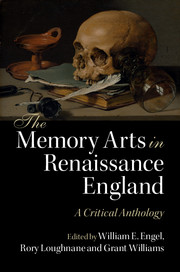Book contents
- Frontmatter
- Dedication
- Contents
- List of figures
- Acknowledgements
- A note on abbreviations
- Introduction
- PART I The art of memory
- PART II Rhetoric and poetics
- PART III Education and science
- Introduction to Part III
- III.1 Thomas Elyot, The Governor (1531)
- III.2 Roger Ascham, The Schoolmaster (1570)
- III.3 Levinus Lemnius, The Touchstone of Complexions (1576)
- III.4 William Kempe, The Education of Children (1588)
- III.5 John Brinsley, Ludus literarius (1612)
- III.6 Robert Burton, The Anatomy of Melancholy (1621)
- III.7 Thomas Sprat, The History of the Royal Society (1667)
- III.8 John Wilkins, An Essay towards a Real Character (1668)
- III.9 Obadiah Walker, Of Education (1673)
- III.10 Robert Hooke, ‘An Hypothetical Explication of Memory’ (1682)
- PART IV History and philosophy
- PART V Religion and devotion
- PART VI Literature
- Index
- References
III.9 - Obadiah Walker, Of Education (1673)
from PART III - Education and science
Published online by Cambridge University Press: 05 August 2016
- Frontmatter
- Dedication
- Contents
- List of figures
- Acknowledgements
- A note on abbreviations
- Introduction
- PART I The art of memory
- PART II Rhetoric and poetics
- PART III Education and science
- Introduction to Part III
- III.1 Thomas Elyot, The Governor (1531)
- III.2 Roger Ascham, The Schoolmaster (1570)
- III.3 Levinus Lemnius, The Touchstone of Complexions (1576)
- III.4 William Kempe, The Education of Children (1588)
- III.5 John Brinsley, Ludus literarius (1612)
- III.6 Robert Burton, The Anatomy of Melancholy (1621)
- III.7 Thomas Sprat, The History of the Royal Society (1667)
- III.8 John Wilkins, An Essay towards a Real Character (1668)
- III.9 Obadiah Walker, Of Education (1673)
- III.10 Robert Hooke, ‘An Hypothetical Explication of Memory’ (1682)
- PART IV History and philosophy
- PART V Religion and devotion
- PART VI Literature
- Index
- References
Summary
About the author
Obadiah Walker (bap. 17 September 1616, d. 21 January 1699) was a tutor, author and college head. A firm royalist, after the Restoration Walker was appointed as Master of University College, Oxford, in June 1676 and established himself as a leading man of letters. His late conversion to Roman Catholicism in 1686 contributed, however, to his downfall; he was later imprisoned and thereafter relied upon the generosity of friends and former students.
About the text
Walker's Of Education is divided into two parts, with chapter subjects ranging from observations on the ‘duty of the parents in educating their children’ (chapter 2) to some considerations on ‘prudence [when] acquiring employment and preferment’ (the final chapter of part II). Walker's stated goal in the work is to ‘furnish some rules and principles of active life’. Walker's practical advice (‘scattered counsels and notions’) on pedagogical practice and learning is drawn from his own teaching experiences and observations and ‘some Italian writers, not ordinary among us’. Despite Walker's late infamy, Of Education was an influential and widely read treatise; the sixth edition of the text was published in 1699.
The arts of memory
Our excerpt is taken from chapter 11, ‘Of Invention, Memory and Judgement; and how to help, better and direct them’. Walker begins by noting the importance of a good memory to scholars and lawyers. Turning to the art of memory, we can perhaps appreciate Walker's candour in bemoaning how its precepts are ‘obscurely delivered by many authors’. Walker advises using town names, London street names, or the signs on a single street – any such sequence that is deeply familiar to the student, with an order ‘perfectly in mind’. To each town, street or sign, the student deposits the word for recollection and assigns to it a ‘fancy’ (mental image); thereby the student recalls the sequence of place, the image attached and the word there deposited. Indebted still to the classical rules for memory places (loci), Walker turns the streets of London into a memory palace.
Textual notes
Obadiah Walker, Of Education, especially of young men (Oxford, 1673), F4v–F7r.
- Type
- Chapter
- Information
- The Memory Arts in Renaissance EnglandA Critical Anthology, pp. 176 - 179Publisher: Cambridge University PressPrint publication year: 2016



